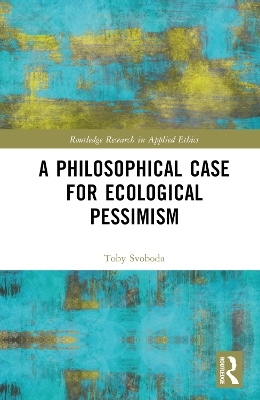
A Philosophical Case for Ecological Pessimism
Seiten
2025
Routledge (Verlag)
978-1-032-94401-2 (ISBN)
Routledge (Verlag)
978-1-032-94401-2 (ISBN)
- Noch nicht erschienen (ca. März 2025)
- Versandkostenfrei
- Auch auf Rechnung
- Artikel merken
Our current ecological crisis—featuring climate change, ocean acidification, and mass extinction—raises moral issues, including a high probability of injustice and massive harm. This book defends a position called ecological pessimism, whose core feature is the belief that ecological catastrophe is likely to occur in the future.
Our current ecological crisis—featuring problems such as climate change, ocean acidification, and mass extinction—raises various moral issues, including a high probability of injustice and massive harm. This book defends a position called ecological pessimism, an attitude whose core feature is the belief that ecological catastrophe is likely to occur in the future.
The author’s defense of ecological pessimism has two components. First, he makes the case that the relevant ecological facts about our world make ecological pessimism a reasonable, and indeed plausible, expectation. Second, he argues that ecological pessimism is morally and practically appropriate. Ecological pessimism is a distinctively moral kind of pessimism because the failure to avert ecological catastrophe leads to great ills for human beings and non-human nature. The author’s account responds to likely objections to ecological pessimism and makes the case against ecological optimism. Despite this, the author makes clear that being pessimistic about our ecological prospects is compatible with the melioristic project of improving our bad condition. He argues that environmental philosophy as a way of life, with its emphasis on environmental virtue and rich resources for developing spiritual exercises, is both a robust and attractive option for an ecological pessimist.
A Philosophical Case for Ecological Pessimism will appeal to scholars and graduate students working in ethics and environmental philosophy.
Our current ecological crisis—featuring problems such as climate change, ocean acidification, and mass extinction—raises various moral issues, including a high probability of injustice and massive harm. This book defends a position called ecological pessimism, an attitude whose core feature is the belief that ecological catastrophe is likely to occur in the future.
The author’s defense of ecological pessimism has two components. First, he makes the case that the relevant ecological facts about our world make ecological pessimism a reasonable, and indeed plausible, expectation. Second, he argues that ecological pessimism is morally and practically appropriate. Ecological pessimism is a distinctively moral kind of pessimism because the failure to avert ecological catastrophe leads to great ills for human beings and non-human nature. The author’s account responds to likely objections to ecological pessimism and makes the case against ecological optimism. Despite this, the author makes clear that being pessimistic about our ecological prospects is compatible with the melioristic project of improving our bad condition. He argues that environmental philosophy as a way of life, with its emphasis on environmental virtue and rich resources for developing spiritual exercises, is both a robust and attractive option for an ecological pessimist.
A Philosophical Case for Ecological Pessimism will appeal to scholars and graduate students working in ethics and environmental philosophy.
Toby Svoboda teaches philosophy and environmental studies at Colgate University. His previous book is A Philosophical Defense of Misanthropy (Routledge, 2022).
Introduction 1. Ecological Risks 2. Understanding Pessimism 3. Evil in Environmental Affairs 4. Objections to Ecological Pessimism 5. Environmental Philosophy as a Way of Life 6. A Case for Meliorism 7. Why Not Optimism?
| Erscheint lt. Verlag | 18.3.2025 |
|---|---|
| Reihe/Serie | Routledge Research in Applied Ethics |
| Verlagsort | London |
| Sprache | englisch |
| Maße | 152 x 229 mm |
| Themenwelt | Geisteswissenschaften ► Philosophie ► Ethik |
| Geisteswissenschaften ► Psychologie | |
| Naturwissenschaften ► Biologie ► Ökologie / Naturschutz | |
| ISBN-10 | 1-032-94401-3 / 1032944013 |
| ISBN-13 | 978-1-032-94401-2 / 9781032944012 |
| Zustand | Neuware |
| Haben Sie eine Frage zum Produkt? |
Mehr entdecken
aus dem Bereich
aus dem Bereich


